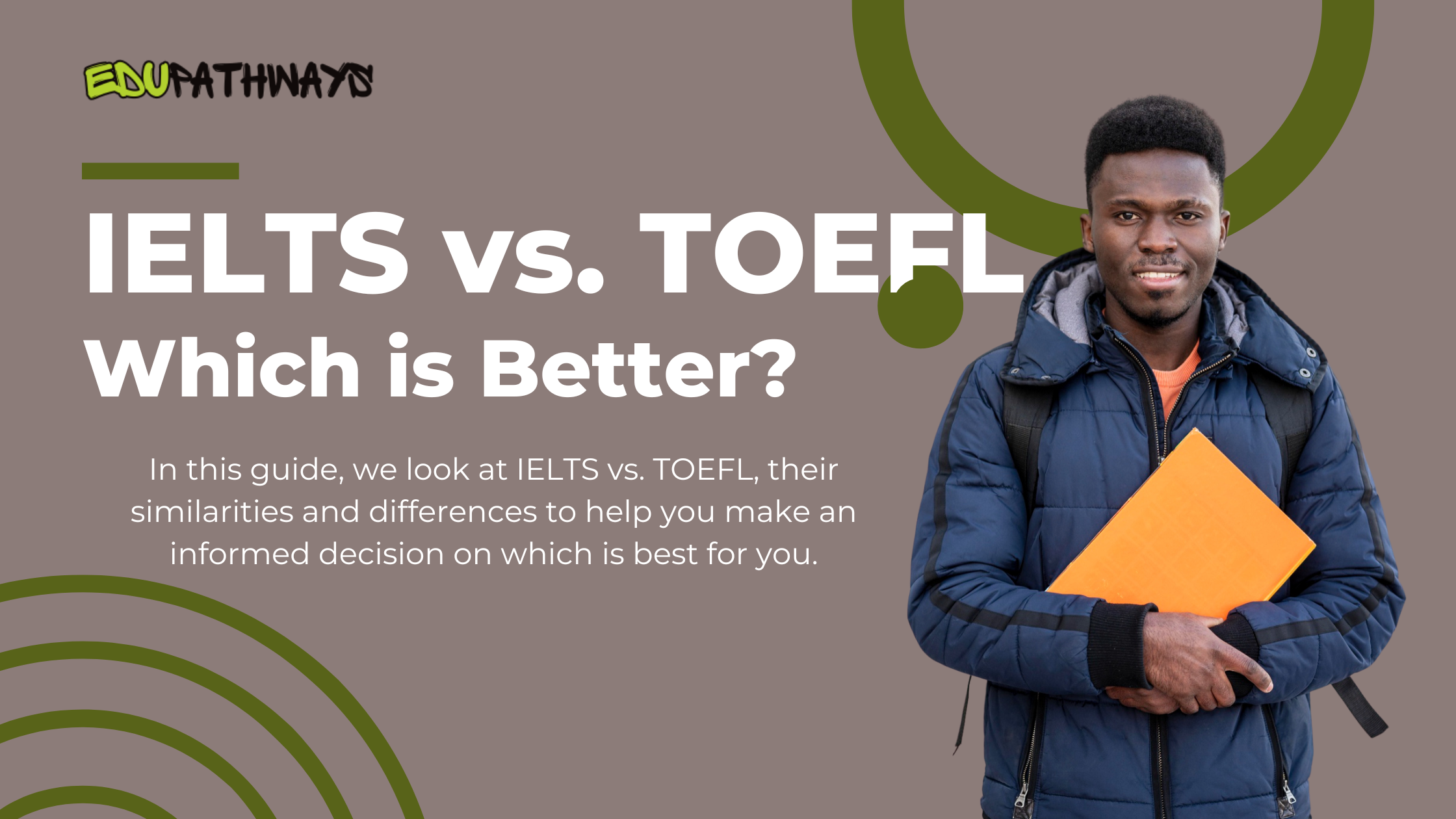Choosing the Right English Proficiency Test for You
Are you interested in studying abroad? Do you have doubts on IELTS vs TOEFL? Which is the best for you? If yes, then this article is for you. To study abroad, you need English proficiency tests like the IELTS (International English Language Testing System) or TOEFL (Test of English as a Foreign Language). These tests assess your ability to communicate in English, which is a requirement for admission to universities in English-speaking countries. However, choosing between them can be a challenge. In this guide, we look at their similarities, differences, strengths, and weaknesses and offer practical advice to help you make an informed decision.
Understanding the Basics: IELTS vs. TOEFL
Similarities
- Purpose: Both tests evaluate your English proficiency for academic purposes.
- Skills Tested: Each test covers four core skills: Listening, Reading, Writing, and Speaking.
- Recognition: Both are widely accepted by universities in countries like the US, UK, Canada, and Australia.
Key Differences between IELTS and TOEFL
| Feature | IELTS | TOEFL |
|---|---|---|
| Origin | Developed by British Council, IDP, and Cambridge Assessment | Administered by ETS (Educational Testing Service) |
| Test Format | Paper-based or computer-based | Primarily internet-based (TOEFL iBT) |
| Speaking Test | Conducted face-to-face with an examiner | Conducted via a microphone and recorded |
| Writing Style | Includes descriptive and formal essays | Focuses on academic essays |
| Duration | 2 hours 45 minutes | Around 3 hours |
| Scoring | Band scores from 0 to 9 | Total score out of 120 |
Scoring Systems and Test Content
IELTS Scoring
- Each section is scored on a band scale from 0 to 9.
- The overall band score is the average of the four sections.
- Emphasizes clarity and coherence in writing and speaking.
TOEFL Scoring
- Each section is scored out of 30, with a total score of 120.
- Offers a detailed breakdown of performance for Listening, Reading, Speaking, and Writing.
Content and Focus
- IELTS focuses on real-life scenarios with a mix of academic and general English.
- TOEFL is more academic-oriented, with passages and tasks resembling university-level material.
Strengths and Weaknesses
IELTS Strengths
- Flexibility: Offers both paper-based and computer-based options.
- Speaking Test: Human interaction helps reduce anxiety for some candidates.
- Real-Life Relevance: Focuses on practical English usage.
IELTS Weaknesses
- Subjectivity: Speaking and Writing sections may be influenced by examiner bias.
- Limited Availability: There are fewer centers in some African regions.
TOEFL Strengths
- Consistency: Scoring is standardized, especially for Speaking and Writing.
- Global Availability: Numerous test centers worldwide.
- Academic Focus: Best suited for US universities and academic contexts.
TOEFL Weaknesses
- Length: The longer test duration can be exhausting.
- Tech-Heavy: Reliance on technology may be a challenge in areas with unstable internet.
Also read: How difficult is the IELTS?
Practical Tips for Nigerian and African Students
Preparation Tips
- Know the Format: Understand and get familiar with the structure of the test you choose. Practice with sample papers or online tools.
- Improve Your English Skills: Focus on grammar, vocabulary, and pronunciation. Listening to podcasts, reading newspapers, and practicing writing are helpful.
- Take Practice Tests: Simulate test conditions to improve time management and confidence.
- Use Local Resources: Employ the use of community groups, English tutors, or language centers in Nigeria or your region.
- Invest in Reliable Study Materials: Purchase official guides and access free online resources tailored to each test.
Test-Day Strategies
- Arrive early and stay calm.
- Follow instructions carefully.
- Manage your time effectively, especially during the Reading and Writing sections.
Applying these stategies will help you get the best out of your test.
Which Test Should You Choose?
For IELTS
- Suitable for students applying to UK, Australian, or Canadian universities.
- Ideal if you prefer face-to-face interaction for the Speaking test.
- Recommended if you want a test format available in both computer-based and paper-based versions.
For TOEFL
- Best for students targeting US universities or institutions with a strong emphasis on academics.
- Ideal for tech-savvy individuals who are comfortable with computer-based exams.
- A better choice if you prefer standardized scoring with limited human bias.
Final Thoughts:
For Nigerian and African students, the choice between IELTS and TOEFL depends on your study destination, learning preferences, and strengths.
- If you aim to study in the UK, Canada, or Australia, IELTS is generally more suitable due to its recognition in these regions and focus on real-life communication.
- If your target is the US, TOEFL aligns well with their academic requirements.
Ultimately, consider your personal goals, the test centers available in your region, and the type of test that aligns with your strengths. Remember, preparation is key to excelling in either test, and both can open doors to global opportunities.


